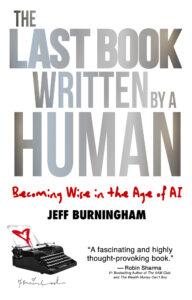I’ve always been a high achiever. Like so many leaders I know, I was slowly worn down by the weight of hustle culture. The constant push to optimize, perform, and do. For years, I lived as a “human doing,” not a human being. But as we stand at the edge of a new era, where machines can handle so much of what we once thought was uniquely human, we have a rare opportunity to make different choices. We can decide what truly matters, lead with heart and soul, and build systems that reflect our deepest values rather than just our most efficient algorithms.
 That realization didn’t come easily for me. It emerged through struggle, reflection, and ultimately transformation. In my new book, The Last Book Written by a Human: Becoming Wise in the Age of AI (Forefront Books, August 2025; 256 pages), I explore what it means to reclaim our humanity in this moment of profound change.
That realization didn’t come easily for me. It emerged through struggle, reflection, and ultimately transformation. In my new book, The Last Book Written by a Human: Becoming Wise in the Age of AI (Forefront Books, August 2025; 256 pages), I explore what it means to reclaim our humanity in this moment of profound change.
I’m honored to share with you this exclusive excerpt, a story from the moment I began to realize just how far I had drifted from who I really was—and how I started to find my way back.
—
Jeff Burningham is a tech investor, entrepreneur, and explorer of human potential. Find out more at www.jeffburningham.com and follow him on LinkedIn.
“It was 2013, and I was seven years into building a multi-billion-dollar real estate private equity firm, as well as in the beginning stages of launching a new venture fund. Despite the heavy demands on my time, I’d decided to add “MBA” to my resume, and because of my already overwhelming schedule would have to complete my studies at night and on weekends.
 That time in my life was especially busy as I ran from one meeting to the next, blindly entrenched in my learned behavior of doing, doing, doing. But I was committed to hitting the next level in my career. (And there was always another level I could achieve by doing something more, right?)
That time in my life was especially busy as I ran from one meeting to the next, blindly entrenched in my learned behavior of doing, doing, doing. But I was committed to hitting the next level in my career. (And there was always another level I could achieve by doing something more, right?)
Which was why it was so strange when one of my professors asked us to envision what we really wanted in life, and I couldn’t immediately think of anything. “Take a few minutes,” he said, “and imagine two or three of the most motivating things to you in your life right now.”
The class sat silent. I took a breath and tried to consider what was personally motivating me at the time. I was anxious but excited to see what grand vision might fill my mind and heart. I had always been an especially big dreamer who’d never had any problem shooting for the moon. Who knew what glorious vision awaited me? Eagerly, I closed my eyes and followed my professor’s instructions. And I saw nothing.
Even though I was “living the dream” and my firm had been “crushing it” for years, in this moment my mind went empty. No glorious vision. No big dream for the future.
Nothing at all. I tried again. My eyes were open now, nervously looking around the room. Were others finding this exercise difficult as well?
Soon, I saw fellow classmates busily typing away on their laptops while my mind remained empty. Discouraged and lonely, I felt like I was chasing something I couldn’t quite grasp, some idea that felt just out of reach.
Growing up a devout Mormon all my life, I felt like I had my priorities straight. God, my wife and kids, our extended family, and loved ones had always been the most critical motivating forces in my life. I knew that rich and intimate relationships mattered most.
But on my current trajectory, trying to build big companies and accumulate as much wealth as possible, I also feared I was sabotaging even the things I held most dear. It was uncomfortable to sit there in that classroom and admit to myself that I was struggling to find joy even in the things I’d always cherished. What was wrong? Was I lost? Was there something broken in me?
As the professor continued to prompt us, every person in that room eventually seemed engaged and inspired while I continued to sit in my seat, quietly staring at a blank screen.
After many rounds of mental gymnastics, two scenarios began to arise, starting slowly then culminating in clarity. Neither made me proud, and both left me reeling for months.
In the first scene, I was at a wild party. As a child of the ’80s and ’90s, I would compare it to a mashup between Yo! MTV Raps and a badass MTV Cribs episode. The vision was filled with beautiful and exotic women, fancy cars, a good beat, and illicit substances to take us all far, far away.
Although I’ve often been told that I am “the life of the party” and I do love to dance, I had never in all my life experienced anything like this. As an observant Mormon, I had never even tasted coffee or tea, let alone tried alcohol or drugs!
Honestly, I knew the party would feel empty in the end, but the idea of a wild release from the pressures I’d created for myself felt like they would be welcome in a twisted but powerful way.
I yearned to be free.
In the second vision, I watched myself calmly close the laptop, pick up my bag, walk out of class, drive to the airport, buy a one-way ticket to the farthest imaginable destination, and disappear from everything. I dreamed of leaving it all behind: my soulmate, my precious children, my dear family and friends, my business partners and employees, and all of my financial investments. If the first vision was basically everything I never considered indulging in, the second was nothing. Just nothing. A lack of any responsibility, any obligation, any ties to the world at all. Maybe then, unencumbered, I could start over in a more measured and wiser way. Both scenarios were unlikely, but the second was even scarier than the first. The great realization of that night, parsed out later with my first-ever therapist, was that the heat and pressure of all my activity had been slowly eating away at me from the inside for quite some time.
Everything in my cultural programming told me I was following a path to happiness, that I was going to end up exactly where I needed to be. But the truth was actually the
opposite. In my attempt to live a big and bold life, I had become another “human doing” instead of a human being, a drone in the system.
To be in a position where my actions and busyness were so far from who I really was had left me reeling. My instincts told me to push harder to muscle through the discomfort, but I was tired of forcing things. I’d been pushing my whole life, and it was getting old.
As a kid, I’d pushed myself to be the best athlete, the best student, the best member of a high-demand religion. As a young man, I’d pushed my way through a two-year church mission with such ferocity that I had missed some of its softer and more meaningful lessons. And once I was out in the workforce, I pushed harder than most to launch business after business, from the end of my undergrad schooling into early marriage and fatherhood—a cycle that lasted for decades. Push, push, push. It was all I knew.
But for the first time in my life, I could not push anymore. I could not force things. Having finally reached my limit, I felt depleted. The only option left was to learn to let go.
That moment in that MBA class became a turning point for me, one that eventually sent me on a quest to India and beyond, though I wouldn’t fully understand its significance until years later. Nonetheless, it was another crack in the facade, an indication that things needed to change.
The visions that came to me that night, both the hedonistic escape and the impulse to disappear, were symptoms of a deeper wound. I had focused so much on doing that I had forgotten how to be.
I believe this is the true and persisting pandemic of our time. My realization would lead me down a path of questioning not just my choices but the very nature of existence itself.
It was the start of something, a journey I am still on. And in many ways, it represents where we’re all headed. For years, I’d over-indexed on activity and accomplishment while under-indexing on the importance of presence and awareness in my daily life! I was finally being forced to face the music. I know I’m not alone in this. As we now hurtle toward a future where machines will be better at most of what we’re doing now, that leaves us with the very real question of, what will we be?
The answer, I’ve come to understand, lies in the very things I’d lost touch with that night: our capacity for deep relationships, for empathy and authenticity, for the richness found in being rather than doing. These are precisely the qualities machines cannot replicate. They can optimize, calculate, and execute, but they cannot feel the weight of existence.”

